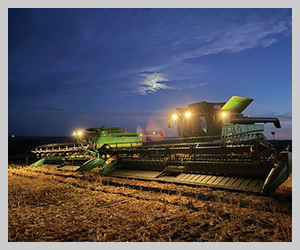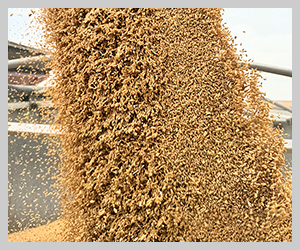Utilizing an LLC and the concept of discounting
2025October 2025
By Norman Brock
Attorney at Law, Brock Law Firm

The intent of this article is to illustrate my opinions on how an LLC (a Limited Liability Company) can be utilized to accomplish leveraging valuations of assets through the concept of discounting.
An example to start
Let’s start with an example. Assume a husband and wife (H/W), a farm family in Washington, have a net worth of $15 million. First, I would analyze their balance sheet to determine IF, when both pass, the second estate would qualify for the Washington Estate Tax Agriculture Exemption. Qualification for the Washington Estate Tax Agriculture Exemption is a whole topic to itself, so for purposes of this article, let’s assume we decide that the second estate (both estates if H/W deceased together) will not benefit from application of the agriculture exemption. OR, even if they do, the couple still has substantially large enough nonag assets to still have a Washington estate tax problem.
To remind the reader, Washington now gives each person a $3 million estate tax exemption, BUT the tax rate climbs quickly to 35%. So, if our goal is to reduce the size of your estate, you could, of course, gift $9 million away, leaving $6 million, which would cover each H/W exemption of $3 million! I don’t, however, see any client willing to gift that large of a percent of their estate, but, just saying, look at gifting as a first choice.
The concept of discounting
Let’s say you own farmland, rental property, or other real estate worth $5 million. Assuming you die owning these assets outright in your estate, the IRS/Washington State Department of Revenue will usually require a formal appraisal, and you are “stuck” with the $5 million value in your estate.
Now, let’s transfer those same assets into an LLC. Let’s assume, for a moment, you do nothing other than set up the LLC, and at death, each spouse still owns 50% of the LLC. What is being valued in your estate: 50% of the net worth OF the LLC assets OR 50% interest in the LLC? To be clear, we are NOW valuing a 50% interest in the LLC. The IRS/Washington State Department of Revenue would argue, likely, that a 50% interest in an LLC is worth exactly 50% of the true full value of the assets held by the LLC, but that is NOT correct, as far as I am concerned. Why? Try selling on the open market a 50% interest in the LLC! Does a 50% ownership have control of the LLC? Get the idea? Now, to keep going here, there isn’t much authority, frankly, on how much less a 50% interest in an LLC is worth, i.e. is it 15%, 25%, or 40% discount? But still, a 50% interest is very arguable for a substantial discount.
How to structure the LLC
Here’s one way I usually set things up. I would create an LLC and issue H/W each 50% of the authorized and issued voting units and nonvoting units (which is how I capitalize my LLCs). I typically originally issue 25,000 LLC units (arbitrary): 2,500 voting units (split evenly between husband and wife) and 22,500 nonvoting units (again, split evenly).
If the husband and wife then gift a small number of voting units (i.e. 10 voting units) to their two children, the ownership of voting units is now 2% for each child and 48% each H/W! Now, the H/W are each in a minority position of control and marketability as clearly recognized by CASE (court decision) law. You won’t find discount in the IRS code nor in Washington Statutes, but case law is solid.
So, if we stopped there, say we have husband or wife and we need to devalue that 48% interest held by the decedent, the question is, given that the decedent now owns only a 48% (in my example) interest in the voting units, what is the appraised value?
There are two discount concepts to consider: 1) lack of control, and 2) lack of marketability. Clearly, husband or wife owning only 48% of the voting units lacks both! So, a discount rate? You will find solid case law for minimum of 15% up to 25% (or more) for each (emphasis added) lack of control and lack of marketability.
To recap: we started with $5 million and each spouse has $2.5 million. If we can devalue, applying a 40% discount to that $2.5 million (I just had an appraisal of 49% discount accepted), the taxable value becomes $1.5 million! We just cut $1 million per each spouse or $2 million out of the total H/W estate!
Now assume the folks go ahead and start gifting the nonvoting units to children and grandchildren. Get the idea? Husband and wife remain in control via being the managers of the LLC. We always utilize simple trusts (another topic) for the children and grandchildren to whom the units of the LLC are gifted to (for control purposes).
Multiple LLCs/Keeping assets separate
Now, let’s get a bit more creative here. Assume a $15 million+ estate, made up of farmland, a couple of rental houses, and maybe throw in a storage unit. Together, say this portion of assets total $10 million+. Now, do we create one LLC and contribute all these varied properties to the one LLC? I’m not a great fan of combining higher risk properties i.e. a rental home with say the farmland (a much lower risk asset).
I will utilize up to three LLCs here:
- LLC 1 for the farm property.
- LLC 2 the rental houses.
- LLC 3 the storage unit.
Then, I’ll form one LLC called “Family Investments LLC” in turn, owning the three referenced LLCs. See the diagram below.

Final thoughts
To summarize, I strongly believe that proper restructuring of a client’s estate, utilizing one or more LLC(s), and positioning for discounting, is a very effective estate planning tool to keep in mind!
Norm Brock has been representing farm families throughout Eastern Washington, Idaho, and Northwestern Oregon for more than 50 years. He works out of the firm’s Davenport and Spokane offices and can be reached at (509) 721-0392 or brocklf.com.
















